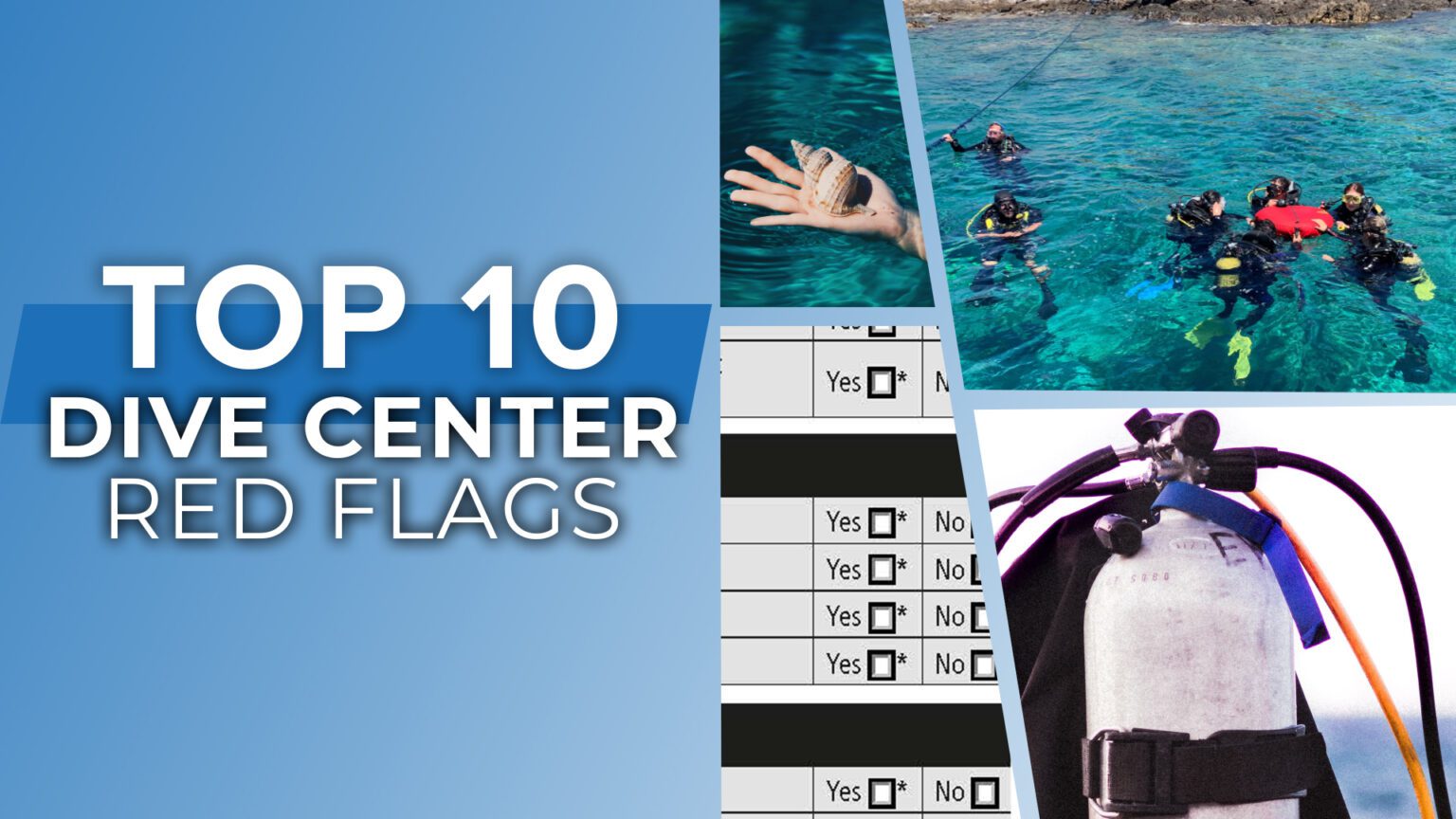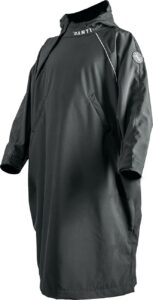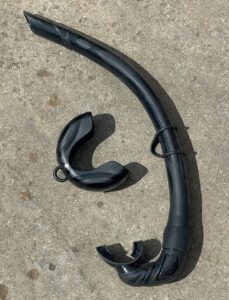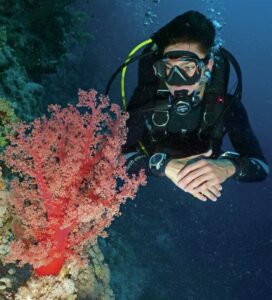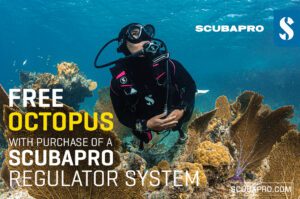Top 10 Scuba Red Flags
First, remember that one bad experience doesn’t necessarily mean the entire dive center is bad, and bad management doesn’t mean that the dive professionals who work there are necessarily bad themselves. So take everything into account when posting online.

FUDGING PAPERWORK
Paperwork is a necessary evil in the diving industry but, if any dive setup recommends that you lie on any paperwork to make their life easier, then stand up and leave. The usual suspect is the self-assessment medical questionnaire. You’ll be faced with a long list of medical conditions, and you need to write yes or no next to each of them. But, the thing is, if you put a yes next to one of them, then you need to get that signed off by a medical professional.
If a pro diver asks you to write no when it should be a yes, you don’t want to go diving with them. Each of those conditions are there for a reason and there could be an effect on your diving but, we’re not medical professionals, we can teach you to dive but, very few of us know how the human body works to that extent. So, you need to get a doctor to sign it off properly.
Be honest on every form, even the form at the end of the dive to log your deepest depth and dive time. Fill everything out accurately and be wary if you’re not given a stack of paperwork to fill out when signing up for a dive.
THEIR GEAR
School and rental gear are used a lot. And while a little wear and tear on the odd BCD can be alright, if all of their gear looks discoloured and knackered then chances of equipment failure increase. I’ve been diving using rental regulators before and the rubber on the hoses was a little bit crumbly but there was no other choice. I dive down to 30-something meters, and everything is fine. Right up until I look up and the 2nd stage floods with water.
There are regulations for how frequently rental and school equipment needs to be serviced. But, if you see frayed hoses or hear some leaking when you’re setting up, then ask for another set. I know a girl who went for a try dive and they gave her a shorty that was so large she could fit the neck over her mouth. If they don’t have equipment that fits you properly you don’t know what else they may be skimping on.
GAS TASTE
If your gas tastes or smells of anything from their compressor, that’s a red flag. And if they wave it off, you need to be very careful. A taste or smell of the gas in your cylinder can mean that your gas is contaminated which is obviously a bad idea to take scuba diving, it’s like breathing from a car exhaust for an hour, it’s just a bad idea, especially underwater, under pressure.
Contaminated air can be caused from a range of problems with their compressor that range from faulty filters to poor air inlet location. Some can be caused by negligence, others may just be an accident that the dive centre is unaware of. So, mention a funny smell or taste to them. And they should really give you another cylinder, and check their compressor. If you’re sure there’s a smell and they try to convince you to dive that cylinder, I’d skip that dive.
RUSHING
Diving is a chilled-out, relaxing sport, and pros rushing about means one of two things. Either they’re disorganized or they don’t value your training. Now don’t get me wrong, sometimes professionals rush to get something done. But when dealing with you they should have all of the coursework and paperwork along with your student record file nice and neatly organized along with any equipment and spares.
During training there are often sections during each training dive that are listed as optional but, a good Instructor won’t skip these sections just to save time. Typically, we have a list of required skills that you need to perform, and to log the dive it needs to be at least 20 minutes long.
If the instructor is watching their computer and ends the dive at 20 minutes but you still have plenty of gas left, they’re cutting your training short. Unless there’s a reason to end the dive early the more time you spend in the water is better for your training.
PACKED LIKE SARDINES
Popular dive centers are a sign of a good dive centers but when you’re shoulder to shoulder with other divers and there’s so much equipment piled on the boat that you can’t move then they’re just trying to maximise profit over diver experience. Dive decks on boats can get crowded at times but, you shouldn’t be tripping over one another to sort out your equipment or risk damaging your gear if it’s at the bottom of the pile of gear.
Also in the water, you shouldn’t be a number in a crowd of divers. During training dives we have strict ratios of professional divers to students. I think 8:1 is the largest ratio, but, a good instructor will minimize that by either bringing more teaching assistants or fewer students.
For guided tours, you’re all qualified divers but, it’s never nice to dive shoulder to shoulder and miss seeing something because the ten other divers ahead of you have scared off whatever that was.
TOO TOUCHY
There have been a few cases of some dive guides being too handsy with guests which is obviously a bad sign. Now, if a guide needs to grab a diver in distress to help them out, or stop a diver from hurting themselves or others, then that’s ok.
We usually try to grab equipment more than body parts. But, if you see a dive guide doing something creepy, you should really speak up.
Dive guides are often fun and friendly and can really improve a dive trip but, there needs to be professional standards and if you’re ever uncomfortable around a dive guide or instructor then speak up.
PICK THINGS UP
The same instructor who teaches students not to touch marine life should not pick things up to show divers or try to spook fish out of their hiding spots so that guests can get a better look. If a guide is playing about with things underwater then that’s a red flag for me to mention something to their higher-ups.
The only thing a diver should really touch in the water is their equipment and the dive ladder. And maybe ghost gear if there’s some fishing gear that needs cleaning up safely. I know that they’re just trying to give their divers the best experience possible but, teasing fish leads to chumming waters and we’re meant to be observers in the water, we don’t touch.
NOT IN STATUS
Anybody can make a website and buy school equipment but, that doesn’t mean that they’re actually qualified to take you diving. You can look up dive centers online on the training agencies' website. If they claim to be a PADI, SSI, or something dive center, then you can do a quick search to make sure that they’re actually affiliated with the training agency they claim to be.
The same with instructors. If you’re ever worried, you can check to see if an instructor is qualified and in status. Some agencies even have a list of expelled professionals who may not represent their training agency. Obviously, if you can’t find their dive center or the instructor on the agency website, that’s a huge red flag. You could get scammed out of your money and never receive a cert card in the post.
POOR COMMUNICATION
As with being organized, a good dive operation should be communicating everything with you so that there are no questions about what everybody needs to do, bring, where they need to be, at what time, and what to do should something bad happen.
If you’re sat in a comprehensive pre-dive safety briefing, you should be in good hands. If the dive guide disappears to do something unexpected on a dive without telling you, that’s not great.
The same with their manner and how they talk about things. We all enjoy a good laugh but, when it comes at the expense of others it can be unprofessional. You shouldn’t hear too much bad-mouthing from a professional diver. They may recommend you against something. But they shouldn’t make fun of other divers
CHEAP PRICES
There may be hidden charges if a course price seems very appealing compared to other similar courses. The cheapest choice isn’t always the best for you so, look for what’s included and more importantly; what is not included in the price.
By the time you’ve bought your logbook, paid for renting your dive gear, and any other hidden costs for things that are included in the price at the other dive center, you’re back to the higher cost anyway and maybe above it.
Good dive centers don’t need to hide their costs. They’ll be competitive but, as with most things in life, you get what you pay for. And better dive equipment, facilities, and better dive instructors cost money. So, if you really need to count every penny, don’t go for the cheapest without calculating the full cost of a course or dive, look for those hidden costs.
Top 10 Scuba Red Flags
